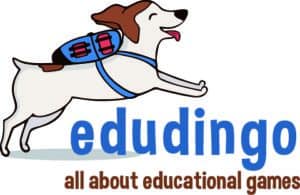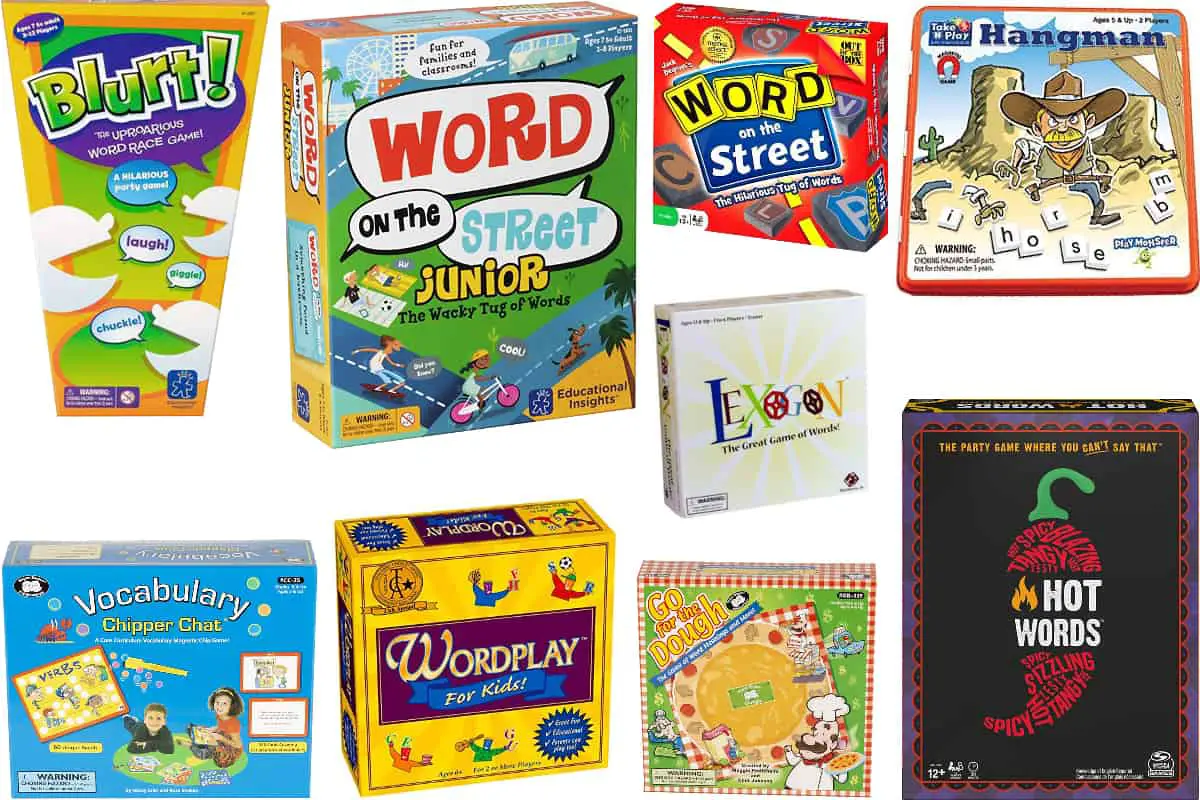This post contains affiliate links.
I found 12 board games to strengthen vocabulary, that can be played at:
- School, like Go for the Dough
- Home, for example Blurt!
- Home and School, where Volangulary is my preferred one
Vocabulary Board Games Comparison Table
I prepared this table to give you a quick comparison on common features of the vocabulary board games.
| Game | Age | Notions | Players | For | Price | Rating |
|---|---|---|---|---|---|---|
| Multiple Meanings Around the World | 9-10 | Multiple meaning words | 2-4 | Home, School | $$ | ★★★☆☆ |
| Synonym & Antonym Gold Rush | 9-10 | Synonyms and antonyms | 2-4 | Home, School | $$ | ★★★☆☆ |
| Blurt! | 7+ | Definitions, clues | 3-12 | Home | $$ | ★★★★☆ |
| Go for the Dough | 5-8 | Opposites, synonyms, multiple meanings, definitions, rhyming, categories | 2-6 | School | $$$$ | ★★★★☆ |
| Volangulary | 6-10 | Definitions, reading, making sentences | 2-6 | Home, School | $$$ | ★★★★★ |
| Quizmo Vocabulary | 10-13 | Synonyms and antonyms | 2-4 | School | $$ | ★★★☆☆ |
| Vocabulary Chipper Chat | 6-10 | Analogies, associations, attributes, categories, comparisons, context, figurative language, functions, homonyms, homophones, synonyms, antonyms, verbs | 2-5 | School | $$$$$ | ★★★☆☆ |
| Vocabulary Family Engagement Pack | 3-5 | Opposites | 1-2 | Teachers to engage families | $$$ | ★★★☆☆ |
| Hot Words | 12+ | Definitions | 4-20 | Home | $$ | ★★★☆☆ |
| Words on the Street | 12+ | Categories | 2-8 | Home | $$$$ | ★★★☆☆ |
| Words on the Street Junior | 8+ | Categories | 2-4 | Home | $$$ | ★★★☆☆ |
| Lexogon | 8+ | Finding words with specific letters | 2-6 | Home | $$$ | ★★★☆☆ |
Vocabulary Board Games for Home and School
Volangulary (Nasco Education)
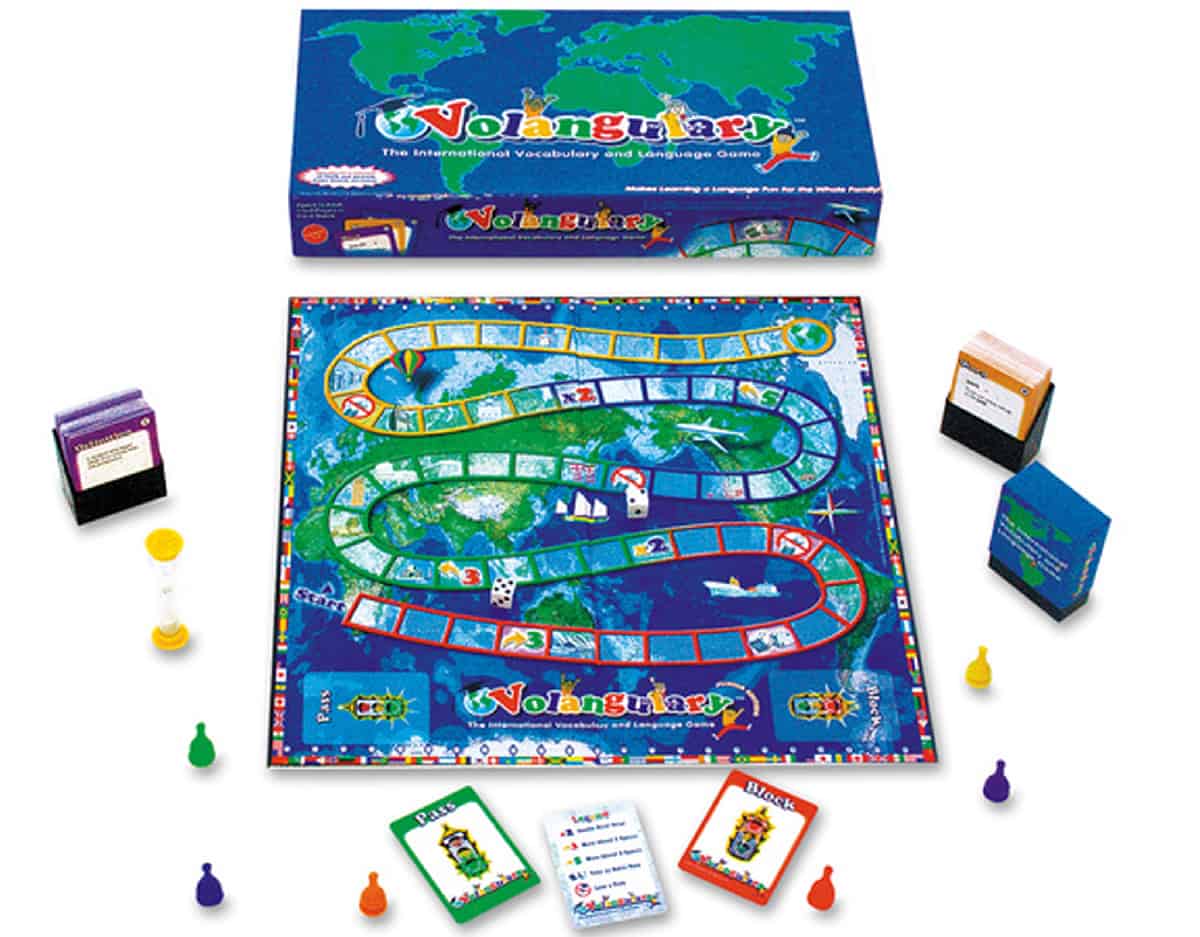
★★★★★
For Families and Teachers | Age 6-10 | 2-6 Players | 30 minutes
In Volangulary , players give answers before the timer runs out. If they give a correct answer, they move forward according to the dice (else they move backward). Players encounter obstacles along the way, and can collect PASS or BLOCK cards.
, players give answers before the timer runs out. If they give a correct answer, they move forward according to the dice (else they move backward). Players encounter obstacles along the way, and can collect PASS or BLOCK cards.
Volangulary presents two levels of play: Junior and Advanced, each using a different side of the board:
- Junior: players use the side of the card with a sentence that uses the word. You can ask them to just read the sentence properly (used for reading practice), or to create a correct sentence using the word by themselves.
- Advanced: players use the side with the definition of the word. They read the definition and must guess the word.
What is great about Volangulary is that:
- It includes 570 cards (so it is truly replayable, and has a lot to offer as a learning material)
- You can really manage a progression
- The three card colors (purple, blue and yellow) correspond to levels of difficulty.
- The actual difficulty is given on the upper right-hand corner of the card as K, 1, 2 and 3
- You can have children of different ages play together while maintaining the interest of the game for all (just select the cards that are relevant for each age). This is a really rare feature that is very valuable at home.
- Enables to work reading words, definitions and building sentences
You can avoid using using pass/block cards, and giving penalties for incorrect answers, as these are more a nuisance than a feature in my opinion.
Multiple Meanings Around the World (Lakeshore Learning)
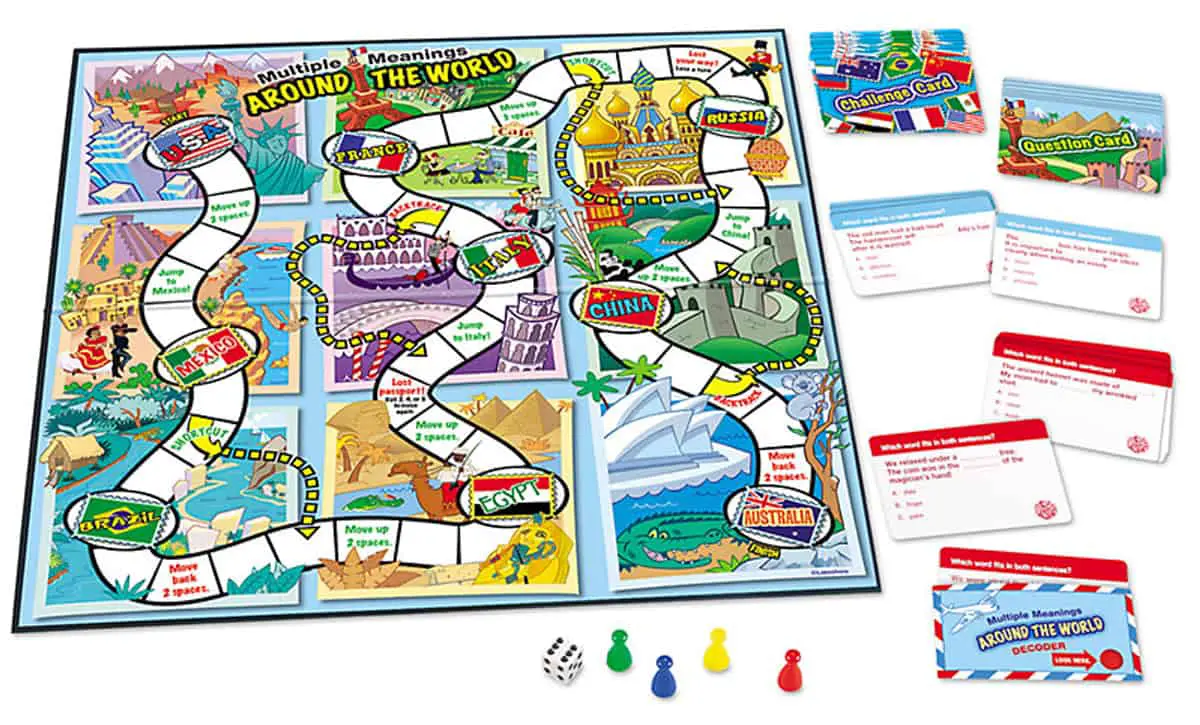
★★★☆☆
For Families and Teachers | Age 9-10 | 2-4 Players | 30 minutes
In Multiple Meanings Around the World , players learn new words by answering questions as they travel in 9 countries of the world, identifying and defining words with multiple meanings.
, players learn new words by answering questions as they travel in 9 countries of the world, identifying and defining words with multiple meanings.
It includes a decoder (provides an answer key through a red filter), 45 question cards, and 20 challenge cards.
The main objective is to reach Australia and answer the question cards correctly.
A player who lands on a standard space has to answer a “question card”.
A player who lands on a country space can choose a “question card” or a “challenge card”:
- Question card– the game proceeds as normal
- Challenge card– if the answer is correct, the number obtained from rolling the dice becomes double which lets the player advance faster in the game. These questions are tough though, so children may either find this exciting or frustrating
Other special spaces are:
- “Jump to” – the player moves to the country that was named on the space.
- “Shortcut”/”Backtrack” – the player moves towards the end of the highlighted path (or the other way)
- “Move up or back X spaces” – the player moves the number of spaces indicated on the board
- “Lost Passport”- the player is stuck until he rolls a 2, 4 or 6.
- “Lost your Way”- the player loses a turn.
The strong points:
- Answers to MCQs can be checked through the decoder.
- The game board has colorful illustrations and easy to follow instructions.
- It can be played cooperatively.
I cannot give more than three stars though, because:
- There are not enough cards, making replayability a real concern
- There is no real progression in difficulty, only the “question cards” and “challenge cards” introduce a level of difficulty
Synonym & Antonym Gold Rush Vocabulary Game (Lakeshore Learning)
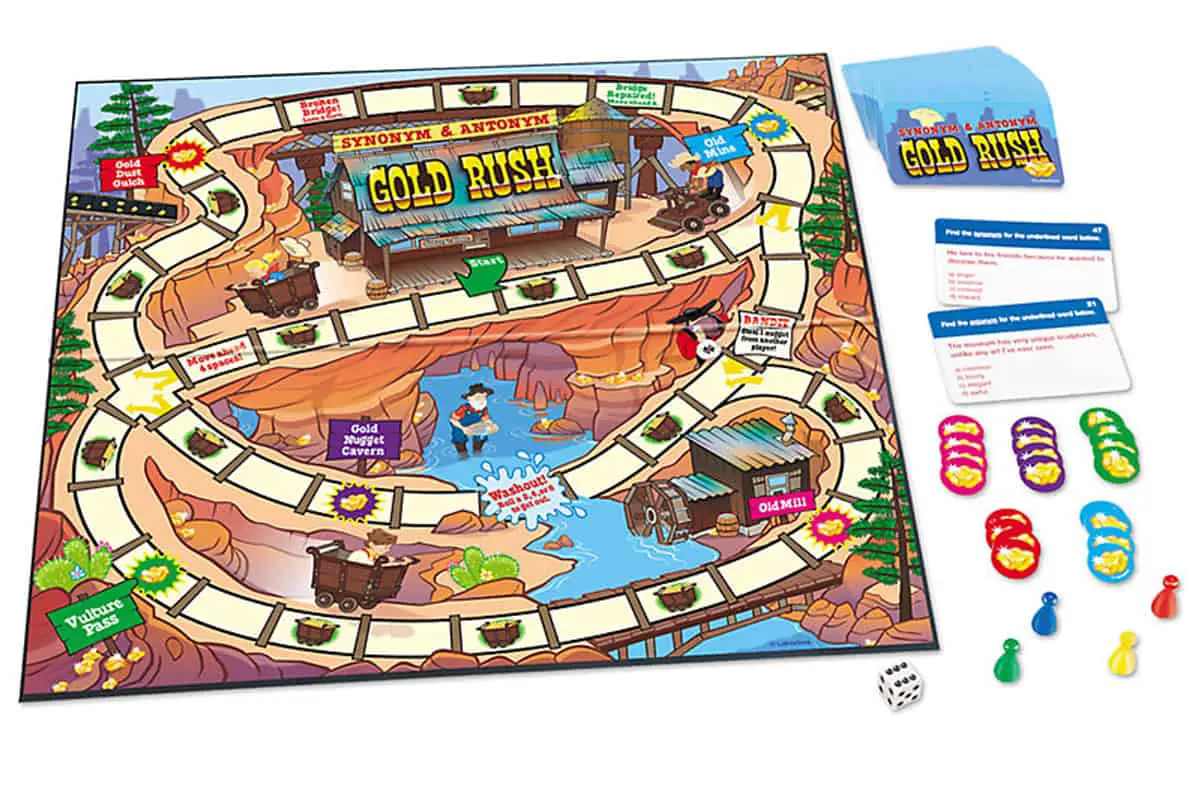
★★★☆☆
For Families and Teachers | Age 9-10 | 2-4 Players
In Synonym & Antonym Gold Rush , players collect golden nuggets (if they provide correct answers) as they race to the end of the board game while answering questions about synonyms and antonyms. You need to have 5 nuggets to win the game.
, players collect golden nuggets (if they provide correct answers) as they race to the end of the board game while answering questions about synonyms and antonyms. You need to have 5 nuggets to win the game.
This game includes 50 question cards, 20 chips, and an answer card.
Each question card contains a sentence with an underlined word. Players must give the synonym or antonym of the given word.
Just like other race board games, there are special spaces with obstacles: Losing a turn, Getting stuck on the mine railway unless they roll a 2, 4, or 6, Having their golden nugget stolen by other players.
Some pros:
- There are no penalties for incorrect answers
- The answers are provided for immediate correction
But the problem is that there are only 50 question cards, which makes the replayability of the game low, and there is no progression (levels of difficulty of question cards are not included). This is why I only give 3 stars.
Vocabulary Family Engagement Pack (Lakeshore Learning)
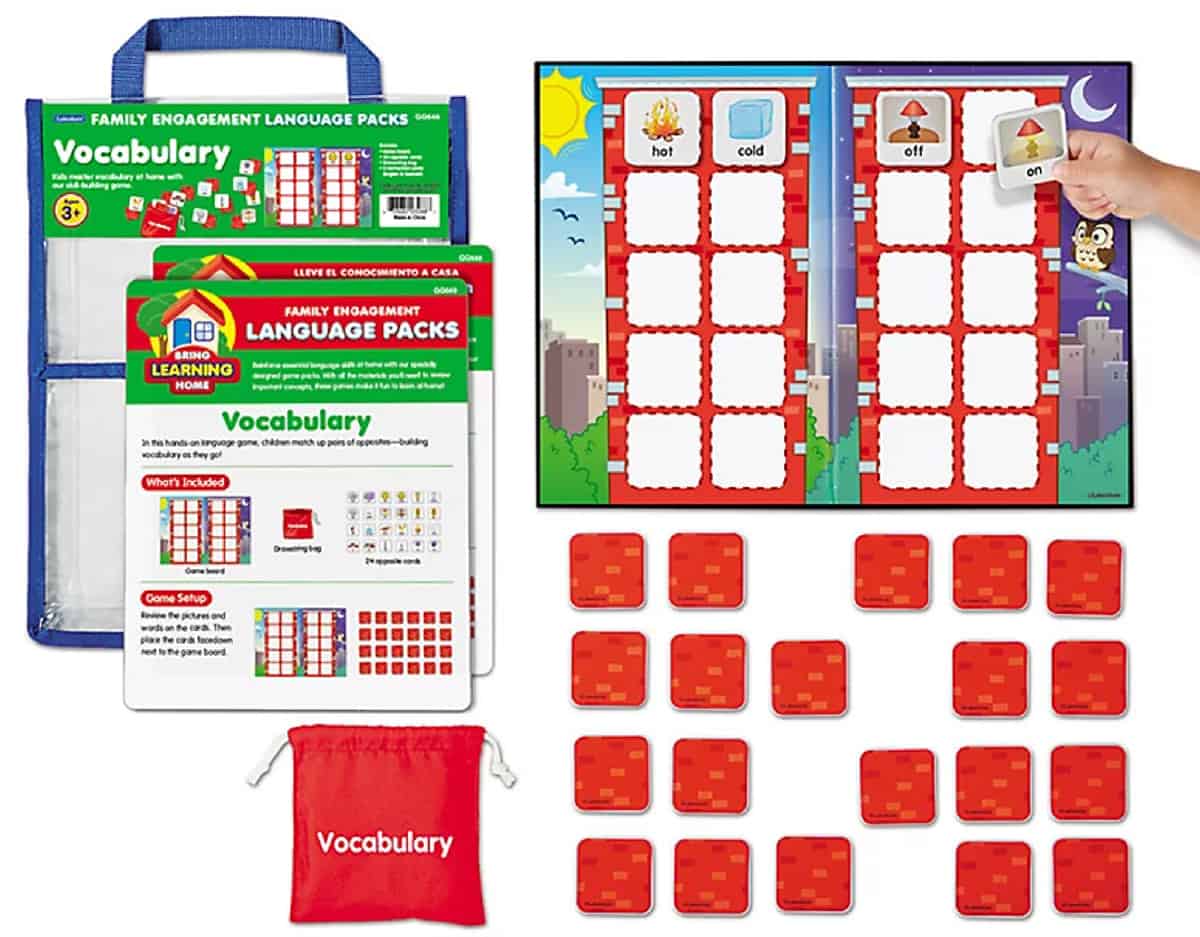
★★★☆☆
For Teachers to engage Families | Age: 3-5 | 1-2 Players | 30 minutes
Vocabulary Family Engagement Pack features 24 opposites cards that players have to match, like with a game of “memory”.
features 24 opposites cards that players have to match, like with a game of “memory”.
Children should review the cards first before placing them face down on the gameboard. Players must get a pair of cards that have opposite meanings.
Card illustrations serve as clues for 3-5 year-olds.
The principle is good and simple, but there are really too few cards included there should be at least twice as many.
Vocabulary Board Games for School
Go for the Dough (Super Duper Publications)
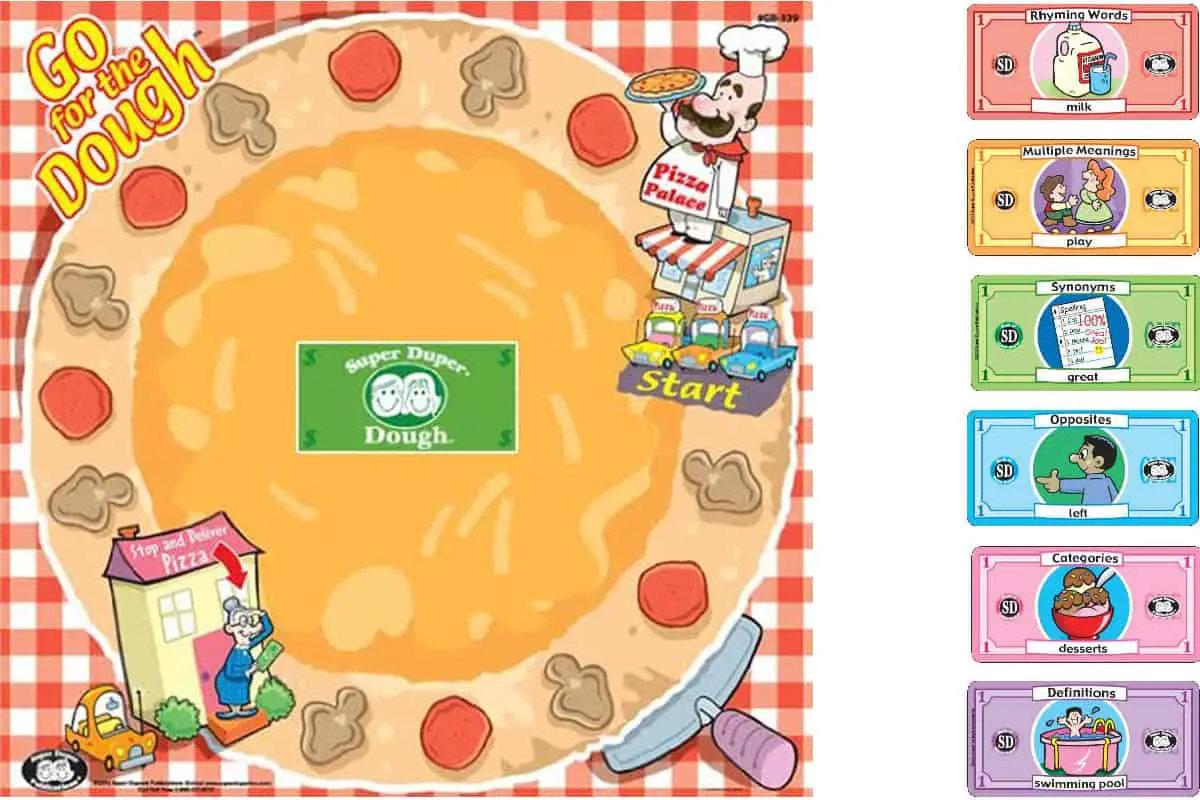
★★★★☆
For Teachers | Age 5-8 | 2-6 Players
In Go for the Dough , players travel across the gameboard to deliver pizza while answering vocabulary questions.
, players travel across the gameboard to deliver pizza while answering vocabulary questions.
This game contains 480 “fake dollar” cards with one word on each, the question belonging to six different types (80 cards per type):
- Opposites: propose an opposite for the word
- Synonyms: propose a synonym for the word
- Multiple Meanings: explain two meanings of the word
- Definitions: give a definition to the word
- Rhyming words: find a word that rhymes
- Categories: propose a category the word belongs to
Players pick a card and answer the question. If they answer correctly, they can move their pawn on the gameboard, according to the number on their die.
Whether the player’s answer is correct or not, the fake dollar card goes to the center of the gameboard (where it will serve as the bank). A player who lands at grandma’s house collects all the cards in the bank.
The player with the highest number of fake dollars, in the end, wins the game.
The good points of this game are:
- 480 questions means the game is replayable
- 6 different notions (which you can filter according to your aim)
- Attractive theme
You can foster collaboration by encouraging students to help others when they have a difficulty in proposing an answer – but after giving enough time to the player at their turn of course.
I regret that there is no notion of progression though.
As there are no answers provided, I do not recommend it to parents, although the game can be played at home of course.
In this section, I included 4 vocabulary board games that are suited for classroom play due to elaborate categories and mechanics.
Quizmo Vocabulary (Learning Advantage)
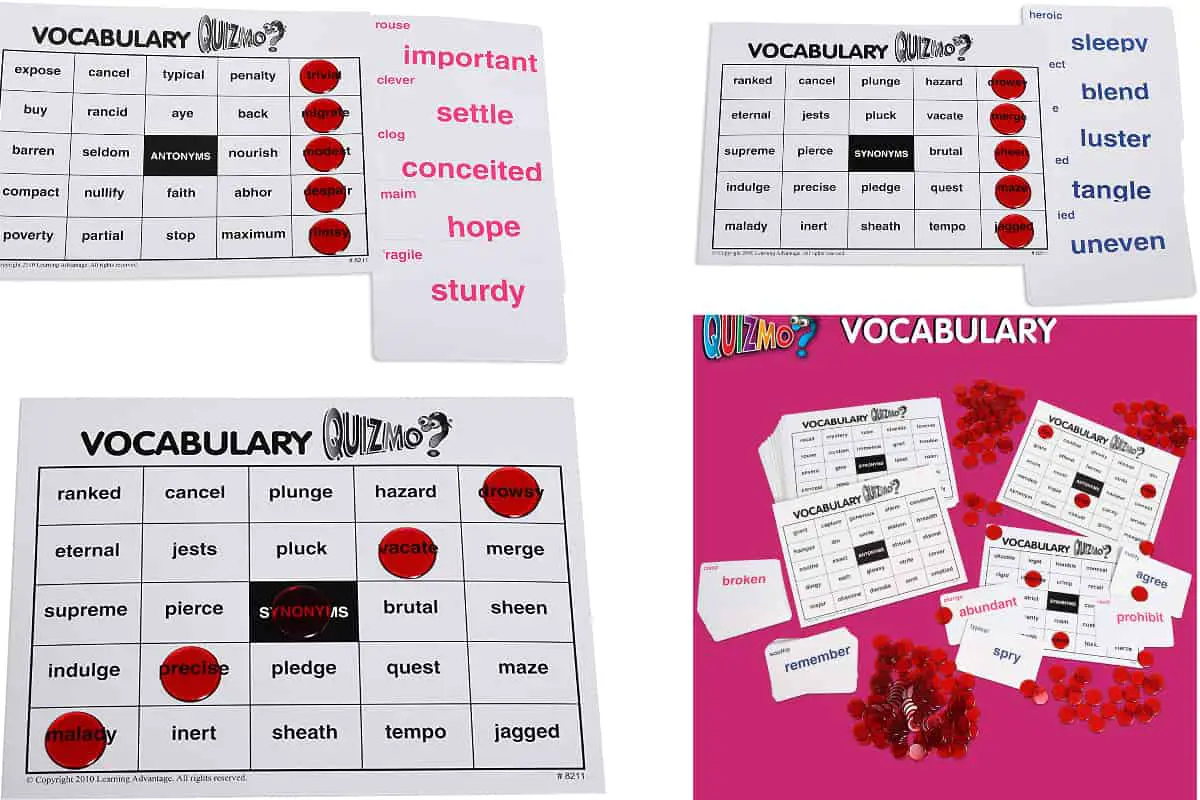
★★★☆☆
For Teachers | Age: 10-13 | 2-36 Players
Quizmo Vocabulary is a 2-in-1 game set that teaches synonyms and antonyms.
is a 2-in-1 game set that teaches synonyms and antonyms.
It consists of
- 36 double-sided grid card
- 240 calling cards featuring 480 questions
- Plastic markers
There are two ways to use it:
- The calling cards can be used as flashcards. Each card is color-coded (synonyms in pink, antonyms in blue) and has the answer on its back
- The grid cards are played like Bingo. Each card has 24 words while the box in the middle indicates the category (synonyms or antonyms). Therefore you can play with a few players, but also with your entire classroom.
Although Quizmo encourages children to learn more words:
- Players may need to consult the dictionary to check the meaning of unfamiliar words (or get help from an adult) which will affect the speed of the game. Including word definitions on the cards would have really helped.
- The design of the calling cards is dull.
- There is no way to manage progression
Vocabulary Chipper Chat (Super Duper Publications)
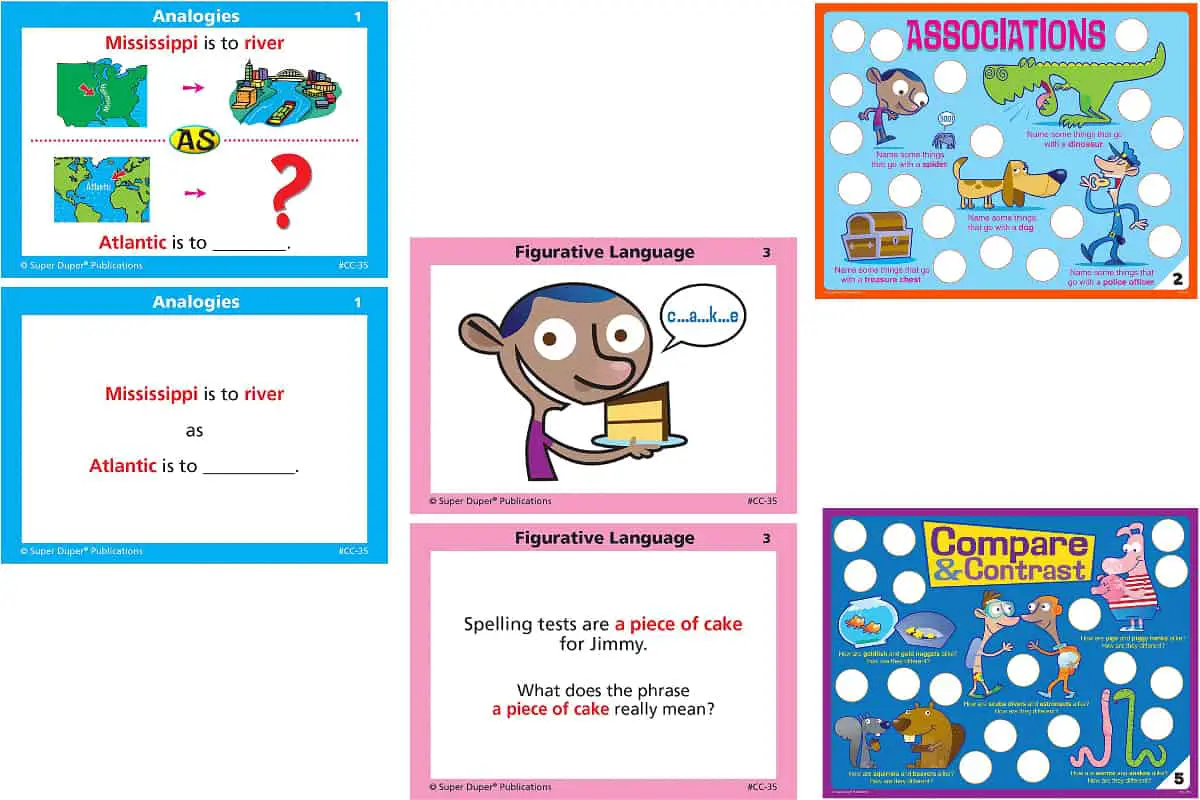
★★★☆☆
For Teachers | Age 6-10 | 2-5 Players | Grade 1-5
In Vocabulary Chipper Chat , players expand their vocabulary using 12 themes:
, players expand their vocabulary using 12 themes:
- Analogies
- Associations
- Attributes
- Categories
- Compare and contrast
- Context clues
- Figurative language
- Functions
- Homonyms
- Homophones
- Synonyms & Antonyms
- Verbs
This game consists of:
- 60 grid gameboards (5 gameboards per theme)
- 360 vocabulary cards (30 color-coded prompt cards per theme), each with an illustration in front and an instruction at the back.
- Magnetic wand, 100 magnetic chips, a pair of dice
To play, draw a prompt card. Follow the instruction. If the answer is correct, roll the die to determine the number of magnetic chips the player should place on the circles of their gameboard.
Players continue until all the circles on their gameboard are filled with magnetic chips. Players use the magnetic wand to collect the chips at the end of each round.
The pros:
- suited for one-on-one session or small group activity
- teachers can assign appropriate categories according to their goal for the session
The cons:
- An adult must be there to correct the answers
- There is no progression within each theme
Vocabulary Board Games for Families
Blurt! (Educational Insights)
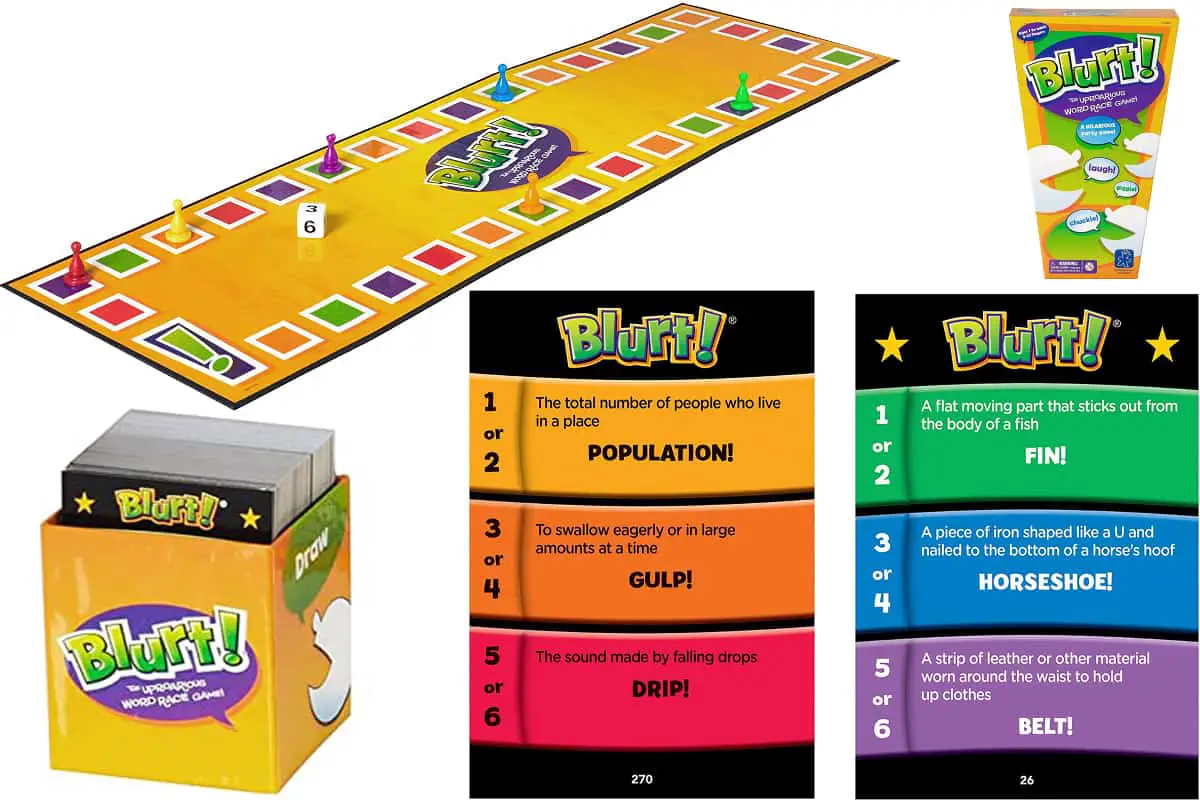
★★★★☆
For Families | Age 7+ with my proposed rule mods, 10+ else | 3-12 Players
Blurt! is a word-racing game where players have to guess words from their definition or clue. It includes 200 cards (6 words per card, so 1200 words overall).
is a word-racing game where players have to guess words from their definition or clue. It includes 200 cards (6 words per card, so 1200 words overall).
The mechanics include rolling the die to determine the number of spaces the player will move on the board and the definition that will be read. The first player to circle around the game board wins the game.
Here are the pros and cons:
- There is no penalty for wrong answers, which is great. Children can try many times as they can until someone blurts the correct answer.
- The game is really replayable with its 1200 words
- But “Blurt!” is really competitive which will discourage slower players or younger players with less vocabulary (unfortunately it is the ones who need to progress the most).
- And there is no notion of progression (the words are not organized by levels of difficulty, which is a pity)
Because of this Blurt! cannot be recommended for use in the classroom.
You can of course change the rule to allow younger players or slower players to participate:
– Make the game cooperative: The aim of the game is for everybody to close the full circle. Players are allowed to give other players clues when they do not find the word, such as the first letter of the word, or the first syllable or the word
– Let younger players time to search before older or more advanced players are allowed to give answers (just use a timer for example)
Blurt! helps:
- Practice word rapid recall
- Learn new words or better understand the meaning of words they already know
Hot Words (Spin Master)
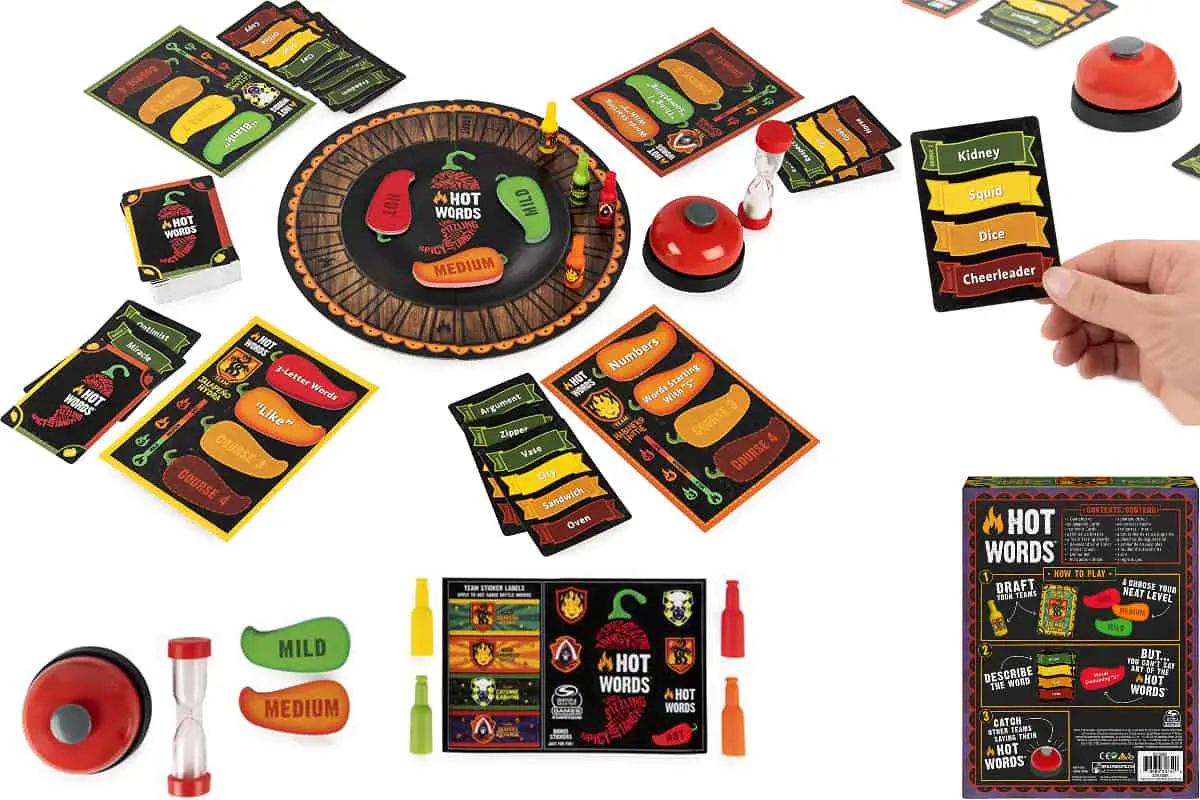
★★★☆☆
For Families | Age 12+ | 4-20 Players
Hot Words is both a fun party game and a word guessing game.
is both a fun party game and a word guessing game.
Players on the same team help each other guess the word they draw by describing it. But they cannot use the “hot words types” described on the “Jalapeno cards” that they have drawn since the beginning of the game (for example a spicy red card is “three-letter words” meaning that you can no longer use three-letter words to describe the word you want the others to guess.
It is restaurant-themed, with several “restaurant artifacts”:
- 4 “team tasting” boards
- 50 “Jalapeno cards”
- 150 word cards
- 4 hot sauce bottles (Playing tokens)
- A dinner bell & a sand timer
This game is great because of its well-designed theme, and its increasing difficulty during the game. Players have to be creative and find alternative ways to describe words (without miming for example).
The players (12+) will not learn new words of course, but they will try to describe and define them under constraints, which is a great exercise.
Word on the Street (Out of the Box)
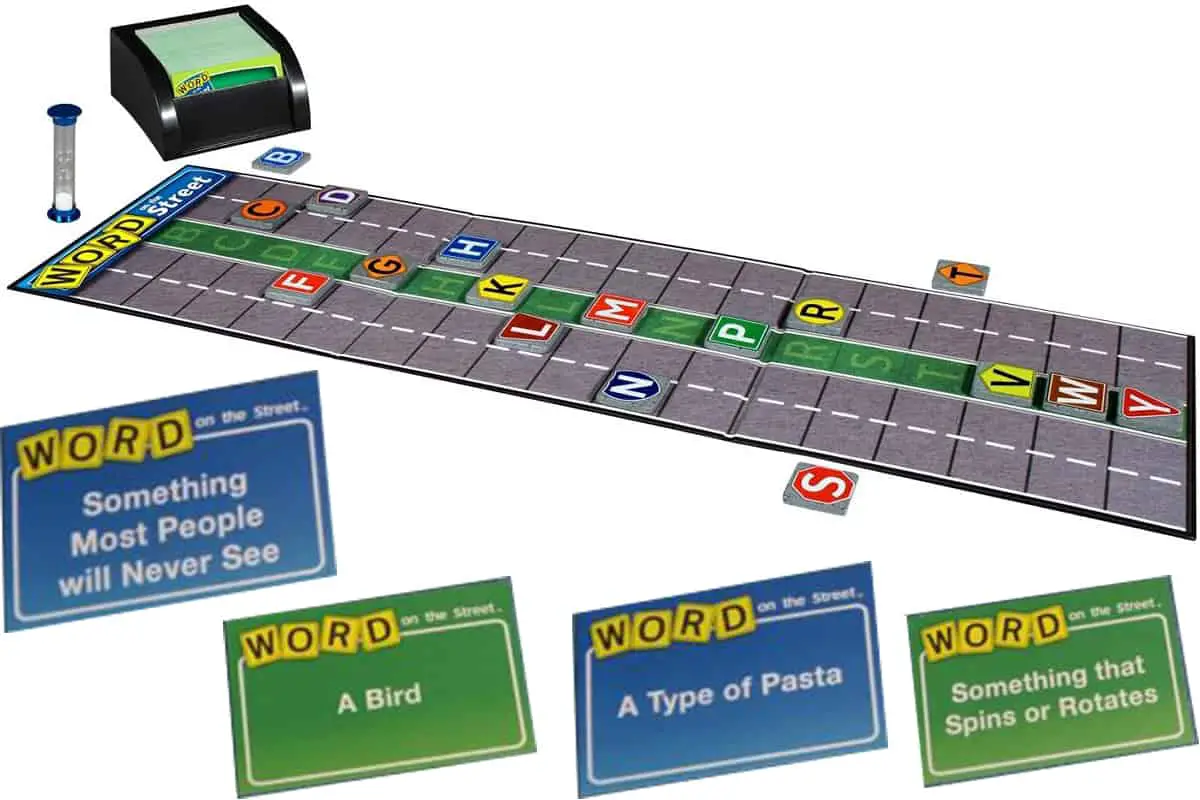
★★★☆☆
For Families | Age 12+ | 2-8 Players | 30 minutes
Word on the Street is played by two opposing teams composed of 1 to 4 players with:
is played by two opposing teams composed of 1 to 4 players with:
- 17 letter tiles: there are no vowels and some consonants are missing like z,j and q
- 108 category cards: double-sided (hence 216 categories) and color-coded according to the level of difficulty (green for easy and blue for difficult)
The main goal is to capture eight letter tiles on the team’s side of the street and get them off the board. It is difficult because:
- Players must come up with the best word according to the available letters set on the gameboard
- The word must fit the category
- The word must be spelled aloud correctly as they move the letters to their side (one lane at a time)
- Opponents can sidetrack each other and recapture letters by using it in their turn (you cannot recapture the letters that are already off the gameboard)
The letters go back and forth on the gameboard in a tug of war fashion as teams take turns proposing words.
“Word on the Street” is effective for educational purposes because it enables to focus attention by selecting specific categories.
What is a little frustrating though:
- It is hard to spell a word that has with missing letters (confusing for beginners)
- A referee is needed to monitor scores and turns because teams may reject a word if it doesn’t fit the category.
Since the mechanics are a bit complex, I suggest children aged 8-12 years old to pair up with adults at first until they get used to the game.
Word on the Street Junior (Educational Insights)
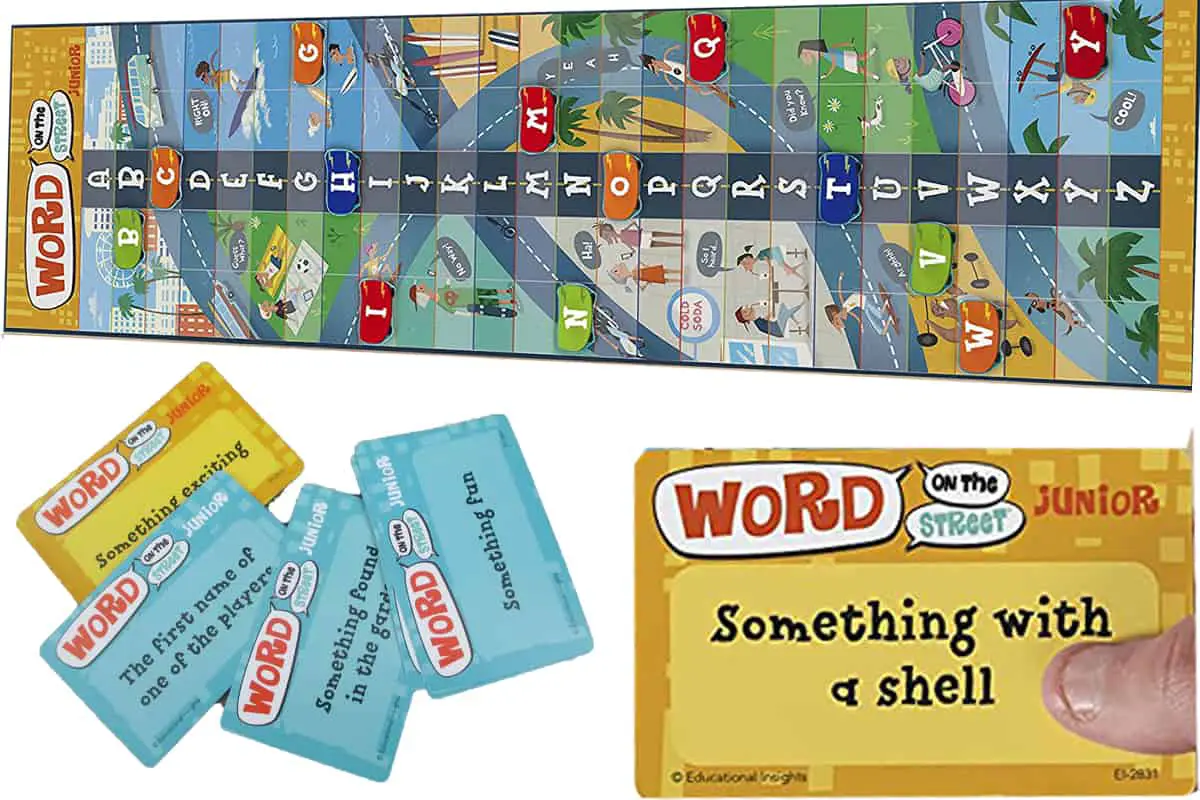
★★★☆☆
For Families | Age 8+ | 2-4 Players | 30 minutes
The rules of Word on the Street Junior are similar to the mechanics of Word on the Street from Out of the Box. Their main difference is the number of letter tiles. It includes all the letters in the alphabet. Categories are also adapted to younger players.
are similar to the mechanics of Word on the Street from Out of the Box. Their main difference is the number of letter tiles. It includes all the letters in the alphabet. Categories are also adapted to younger players.
Lexogon (Tippecanoe Games)
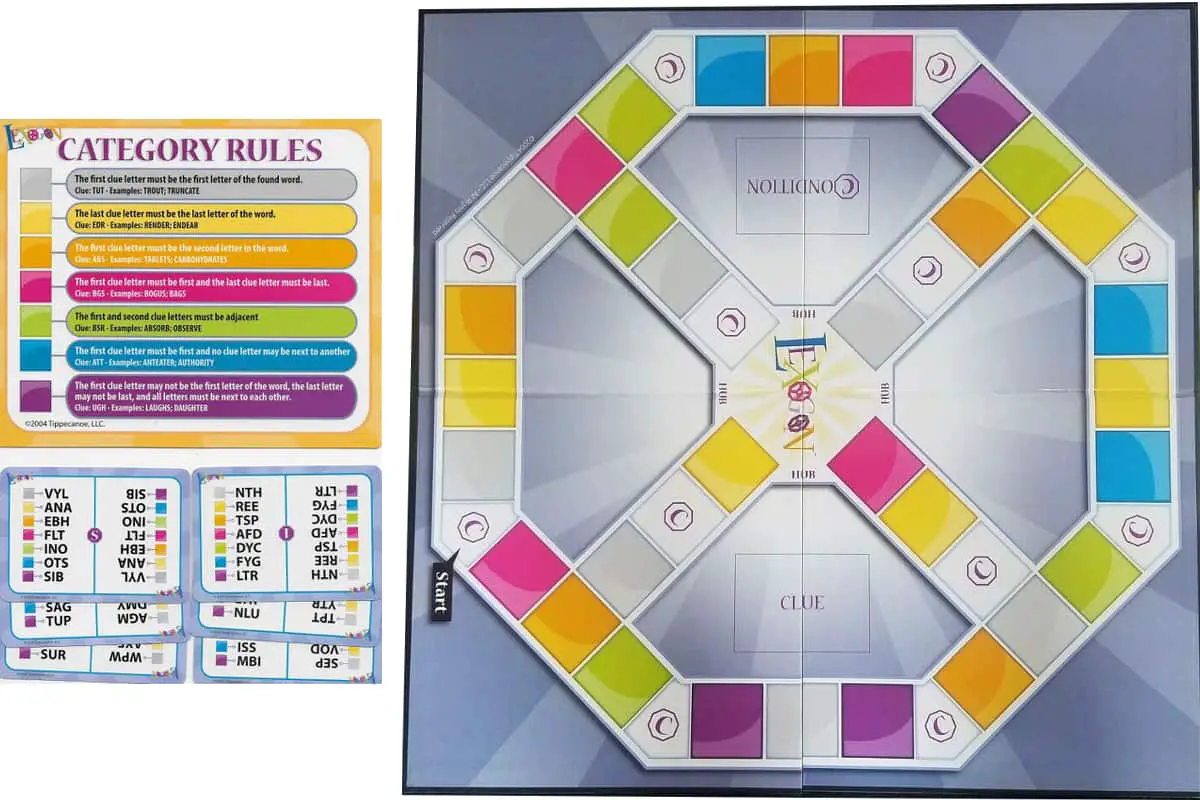
★★★☆☆
For Families | Age 12+ | 2-6 Players | 45 minutes
In Lexogon , players move around the gameboard to find 7 words that use the 3 letter clues each. The first player to find the words in all 7 categories wins the game.
, players move around the gameboard to find 7 words that use the 3 letter clues each. The first player to find the words in all 7 categories wins the game.
This game contains
- 230 clue cards (115 standard which are for children & 115 intermediate recommended for adults), having each 7 color-coded three-letter clues.
- 67 condition Cards
- Two sand timers & Score Pads
Players :
- Roll the die and move their token by the number of spaces indicated by the die.
- If on a condition square on the board, draw a condition card and apply the rules given by this card
- Else, use the clue on your clue card that matches the color on your square, and the “category rule” for this color
- Find words that fits the targeted clue and rule (within 90 seconds).
Here are the pros and cons
- Younger players can use the “standard clue cards” while adults use the “intermediate clue cards”, making it possible for younger players to beat adults
- The condition cards create randomness in the game, making it possible for weaker players to win
- The 7 types of clues (and corresponding category rules) are confusing though. You might want to simplify them at first.
How Effective are Games in Vocabulary Acquisition?
Games offer repetition which is one of the most effective ways to learn new words.
Students need to be exposed to a new word five to sixteen times to acquire it. Playing vocabulary board games can increase that chance for a new word to make it into long-term memory.
Games maintain students’ motivation in vocabulary learning.
Students remember things faster and better when they are relaxed, interested, and entertained. All these factors can be found in playing vocabulary board games.
Edudingo.com is a participant in the Amazon Services LLC Associates Program, an affiliate advertising program designed to provide a means for sites to earn advertising fees by advertising and linking to Amazon.com. We also participate in other affiliate programs which compensate us for referring traffic.
